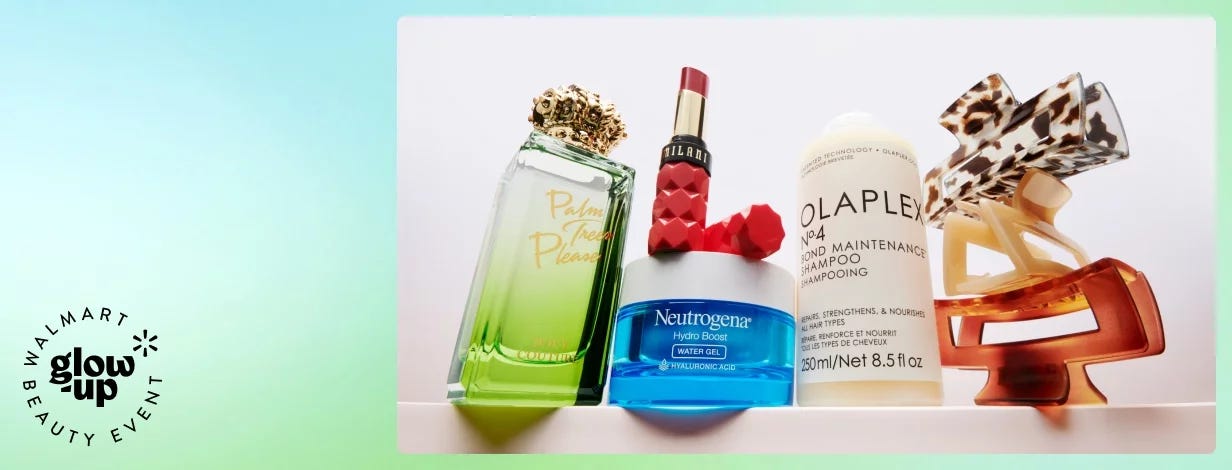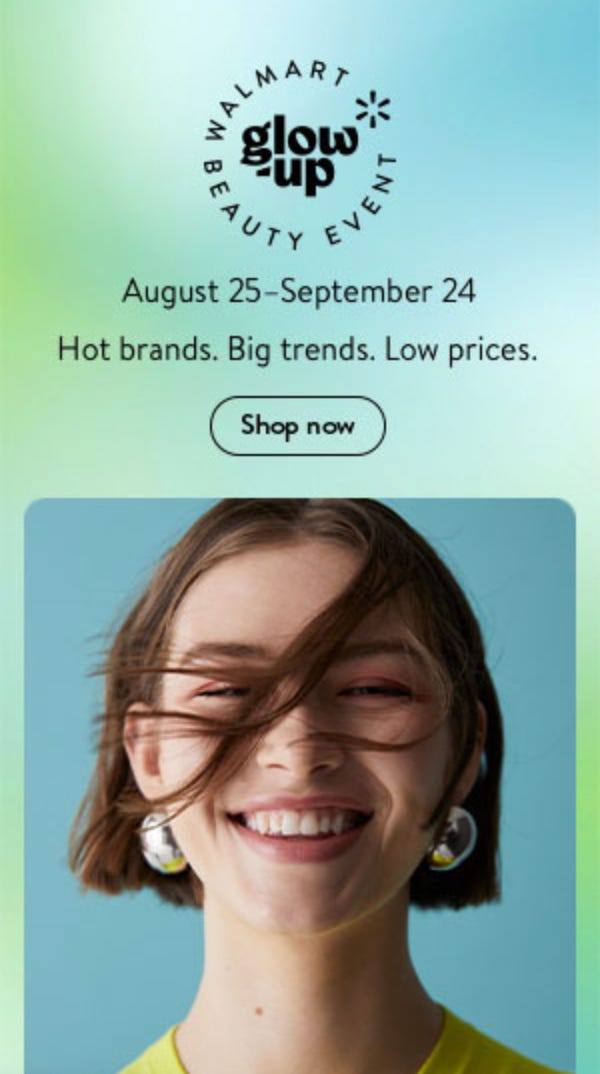Walmart's Beauty Glow-Up Event Linked To Anti-Abortion & Anti-LGBTQ+ Legislation
The corporation consistently donates to politicians working to revoke the rights of women and queer people.
“Walmart’s Beauty Glow-Up Event Is Packed With Makeup Deals,” Allure informed me via email this weekend. A better subject line might have been, I think, “Walmart’s Beauty Glow-Up Event Is Linked To Anti-Abortion & Anti-LGBTQ+ Legislation.”
As I reported a year ago, Walmart donated nearly $100,000 to politicians sponsoring national abortion ban bills from 2021 to the time of publishing, and has donated over $1.1 million to political organizations supporting anti-abortion politicians since 2016. And as I reported in June, Walmart has donated at least $650,250 to anti-LGBTQ+ politicians since January 2022 — including those pushing Florida’s “Don’t Say Gay” law and anti-trans bathroom ban, Tennessee’s anti-drag bill, Texas’s attack on gender-affirming medical care, and more.1 These donations are ongoing, and consistent, and likely to continue. (While Walmart announced it would suspend donations to lawmakers who voted against certifying the election in 2021, it has made no such announcements about its anti-choice or anti-LGBTQ+ donations.)
Beauty enthusiasts should pay attention to this — because Walmart is certainly paying attention to beauty enthusiasts.
Cosmetics have “proven to be resilient amid global economic crises and in a turbulent macroeconomic environment,” global management consulting firm McKinsey reports, and “beauty is now an industry that many people, from top-tier financiers to A-list celebrities, want to be a part of — and with good reason.” The category’s growth is outpacing that of apparel, footwear, eyewear, pet care, and food and beverages. It makes sense, then, that Walmart has spent the past three years strategically expanding its beauty offerings.
Sine 2020, the corporation has doubled the size of its Black-owned beauty section through deals with UOMA Beauty, KINLO by Naomi Osaka, Flawless by Gabrielle Union, and more. It became a core retailer for legendary makeup artist Bobbi Brown’s supplement brand (Evolution_18) and the exclusive retailer for Halsey’s newest makeup brand (af94). Traditionally known for its low prices, Walmart even entered the high-end beauty space via an alignment with Space NK, bringing on luxury brands like Lancer Skincare, By Terry, and Phillip B.
Its calculated effort to court more beauty customers is paying off (and, again, paying legislators intent on revoking the rights of women and queer people): Walmart is the second-largest online retailer for beauty products nationwide.2 Its 2021 category profits nearly doubled those of industry giant Ulta Beauty.
Walmart aims to further cement this foothold in the cosmetic industry with its highly-publicized 2023 Beauty Glow-Up Event, which has been covered everywhere from CNN to Entertainment Tonight. The “celebration” echoes Amazon Prime Day by incentivizing high-volume shopping through deep discounts on makeup, skincare, haircare, and fragrance — except it’s longer (it lasts from August 25 to September 24) and exclusive to beauty products.
“The savings include your reliable go-to’s like CoverGirl, Neutrogena, L’Oreal, Olay, and Sally Hansen,” Well + Good explains in an article sponsored by Walmart, “but there’s also opportunities to save big on luxe brands such as Olaplex, Mario Badescu, and St. Tropez.” Allure suggests picks from Clinique, Calvin Klein, Dyson, and more using Walmart affiliate links.
Both examples illustrate how Walmart’s abortion-ban-backing profits are padded by the beauty media — and vice versa — via paid advertisements (Byrdie Beauty and Cosmopolitan were among the top ad publishers driving clicks to walmart.com in the past year) and affiliated e-commerce (when a publisher links to an affiliate product, and a reader clicks that link and buys that product, the publisher gets paid a percentage of that sale).
It’s not just the traditional media that facilitates Walmart’s beauty earnings, though. Social media influencers on YouTube, Instagram, and TikTok are currently collecting commission from sponsored Walmart Beauty Glow-Up Event content. Many feature affiliate shopping links from the retailer year-round. In order to take advantage of the well-established social-to-sales pipeline, Walmart pioneered an “innovation partner program” with TikTok last year, and regularly hosts livestream shopping events on the platform.
All of the above — brand partnerships, media advertisements, social content, customer sales — help to make Walmart’s profits and political contributions possible.
To be clear about what this means: Walmart is capitalizing on its reputation for affordability and inclusivity while subsidizing policies that will disproportionately harm poor communities and people of color. Walmart-affiliated brands are marketing their products as tools of health and care while financially supporting politicians who want to limit women’s and queer people’s access to healthcare. An industry that promises empowerment is set up in such a way that — whether directly or indirectly — almost all of its companies, creators, and customers are implicated in funding oppression.
Walmart’s Beauty Glow-Up Event may help you “achieve the flawless base, eye, and lip makeup you deserve,” as Allure says. If only Walmart executives believed you deserve safety, equality, and bodily autonomy as much as discounted Juicy Couture body spray.
The largest is Amazon, which — are you surprised? — also financially supports anti-abortion and anti-LGBTQ+ legislators.






I am sharing this everywhere! I’ve been trying to convince people to stop shopping at Walmart for years… this piece of yours says it all! Thank you!!
Jessica, thanks for this terrifically important reminder. Now...I hope you get f*cking well! xo